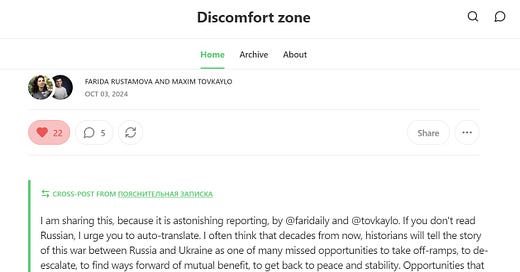Farida Rustamova's and Maxim Tovkaylo's reporting on the dark turn following diplomatic breakdown
How the Kursk incursion caused the Qatar negotiations on a partial ceasefire to implode and put things on a worse course
Yesterday, I cross-posted the original Russian version of
and ’s reporting on the current attitude in the Kremlin towards negotiations:Unfortunately, Substack’s cross-posting function has a glitch, so some 20% of subscribers did not receive the email. I can’t find out which 20%, unless I cross-check lists manually, and Substack technical support has no answers, either. So no more cross-posting.
Today,
, who is known for her excellent sources among Kremlin insiders, and broke the story of the outlines of the 2022 Istanbul agreement in real time, has published a translated version of the original Russian article on her Substack.Her and her co-author Maxim Tovkaylo’s account is simultaneously devastating and hopeful, or maybe devastating because there could have been hope. Before Ukraine’s Kursk incursion,
“the Russian and Ukrainian militaries were close to reaching a deal in which both sides would stop attacking the other’s energy infrastructure. The plan was to ink a deal in Qatar on 22 August or 23 August at the first meeting between Russian and Ukrainian generals [emphasis added] since the full-scale invasion.”
But there was more:
“It would have been a win-win situation,” said a source close to those involved in the negotiations. “Between 15 percent and 20 percent of Russia’s oil refining capacity had been knocked out and winter was bearing down on both sides.” According to him, there were also other proposals for de-escalation on the table, including an agreement not to use some particularly destructive types of weapons, and limit strikes to a certain distance from the frontlines [emphasis added].
This is remarkable. As partial ceasefires go, this one would have covered a very large part of the war. The agenda of this negotiation shows both sides’ awareness of the impact of the war on civilian populations, and a readiness not only to take it into account, but to center it in their mutual engagement. It also illustrates the Qatari mediators’ focus on civilians’ well-being as a humanitarian imperative and a strategy that holds great promise for agreement and further steps towards war termination.
The proposals under discussion echo long-standing efforts to regulate and ultimately prohibit the use of explosive weapons in populated areas, which resulted in a political declaration (an interim step leading, it is hoped, to an eventual treaty) in 2022. As of now, it has been endorsed by 86 states.
That said, the authors’ account is grim. Ukraine’s surprise incursion into Russia’s Kursk Oblast not long before this agreement was due to be finalized has apparently crushed what tenuous hope for a negotiated de-escalation there was. Trust between the two sides must have been fragile enough before and now seems to have evaporated on the Russian side and replaced with blistering rage (the prerogative of a hypocritical aggressor, apparently).
Once again, as with the Istanbul negotiations in spring 2022, I wonder whether Ukraine’s Western partners could have made pro-active efforts to shore up these incipient talks, to throw their weight behind them. Maybe this chance at de-escalation wouldn’t have been gambled away in such a high-stakes game.




Very interesting post about missed opportunities and things apparently going on behind the scenes.